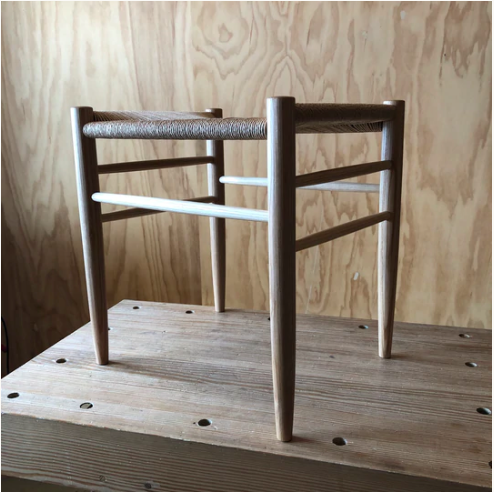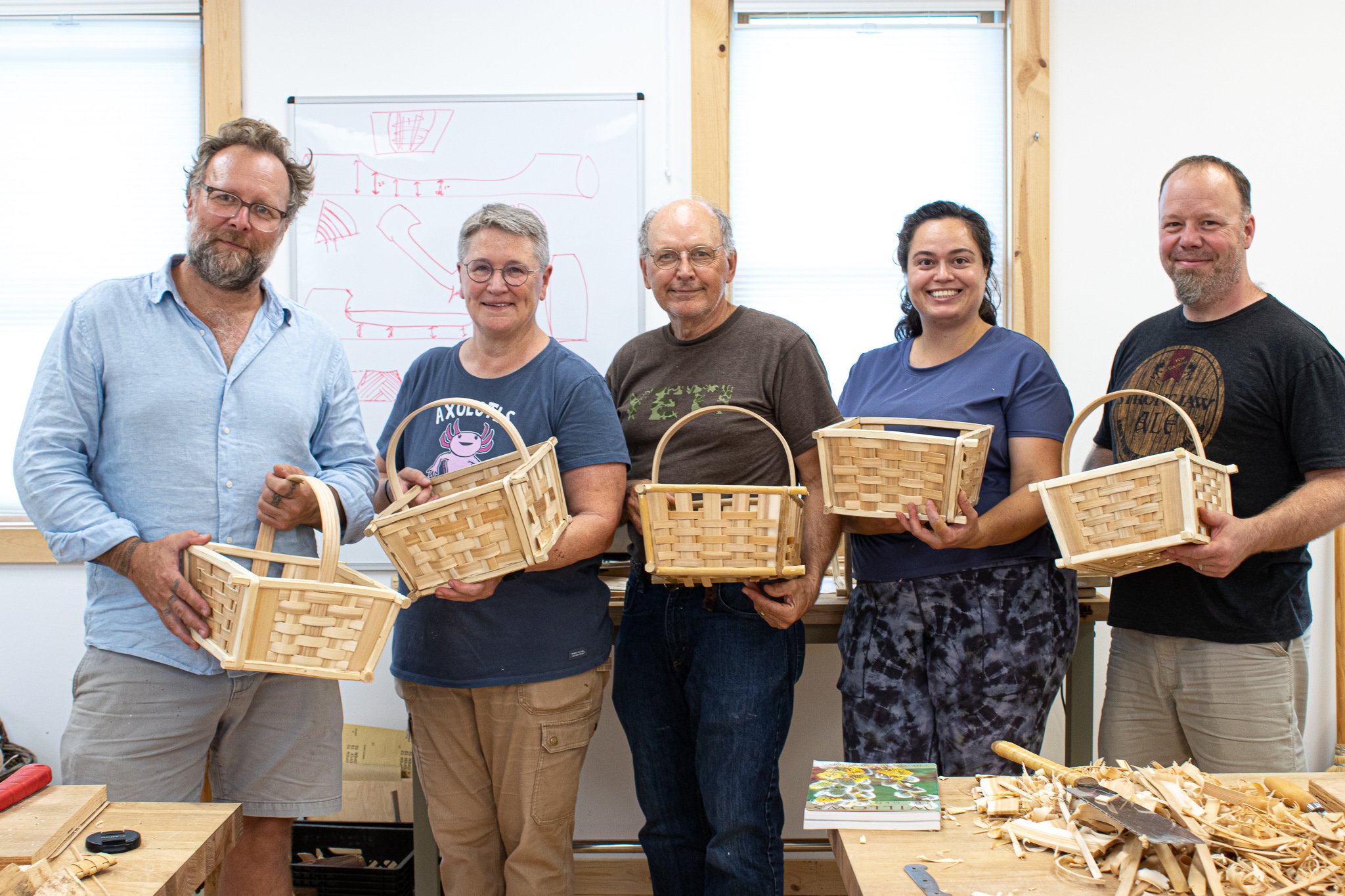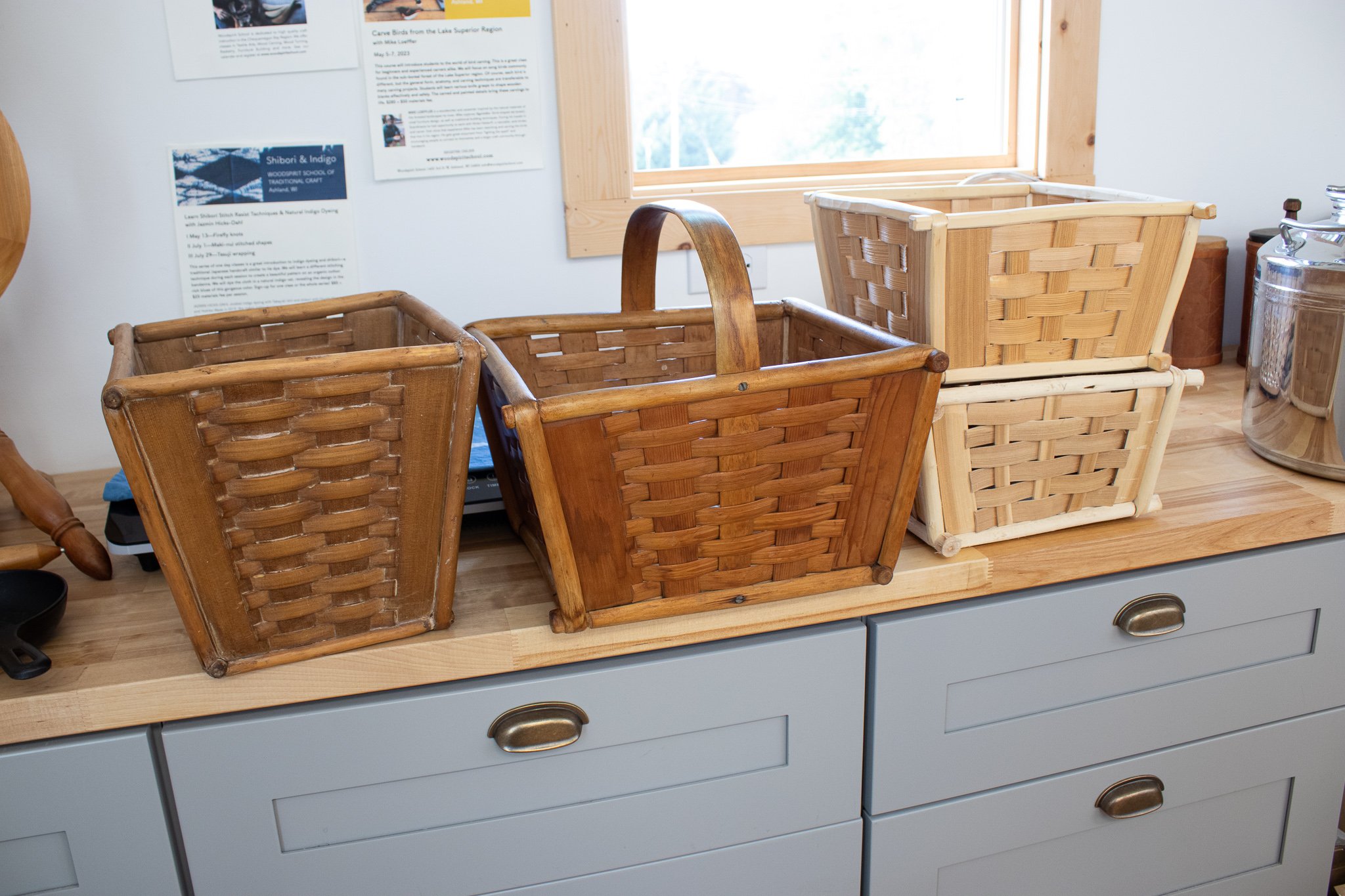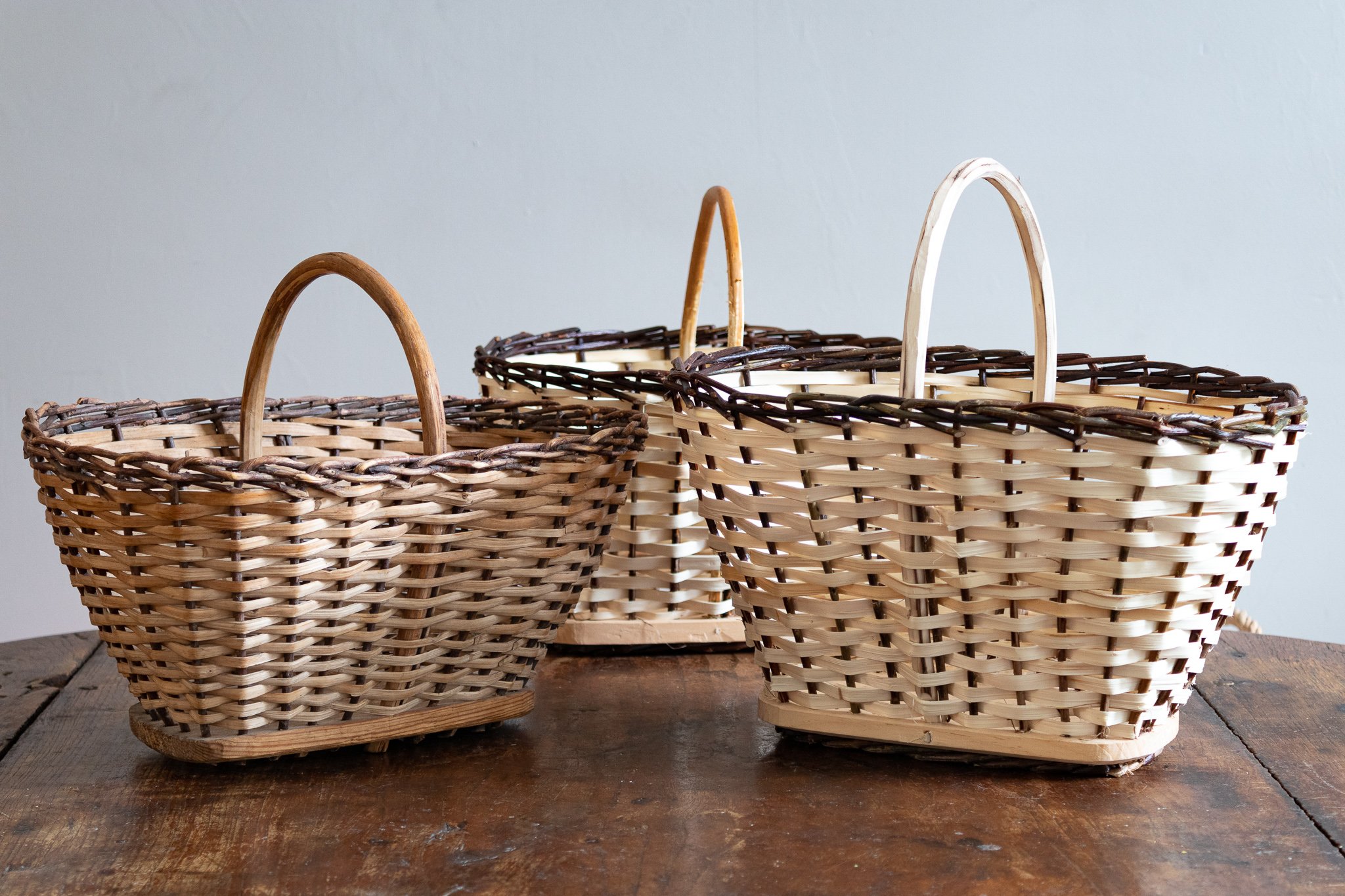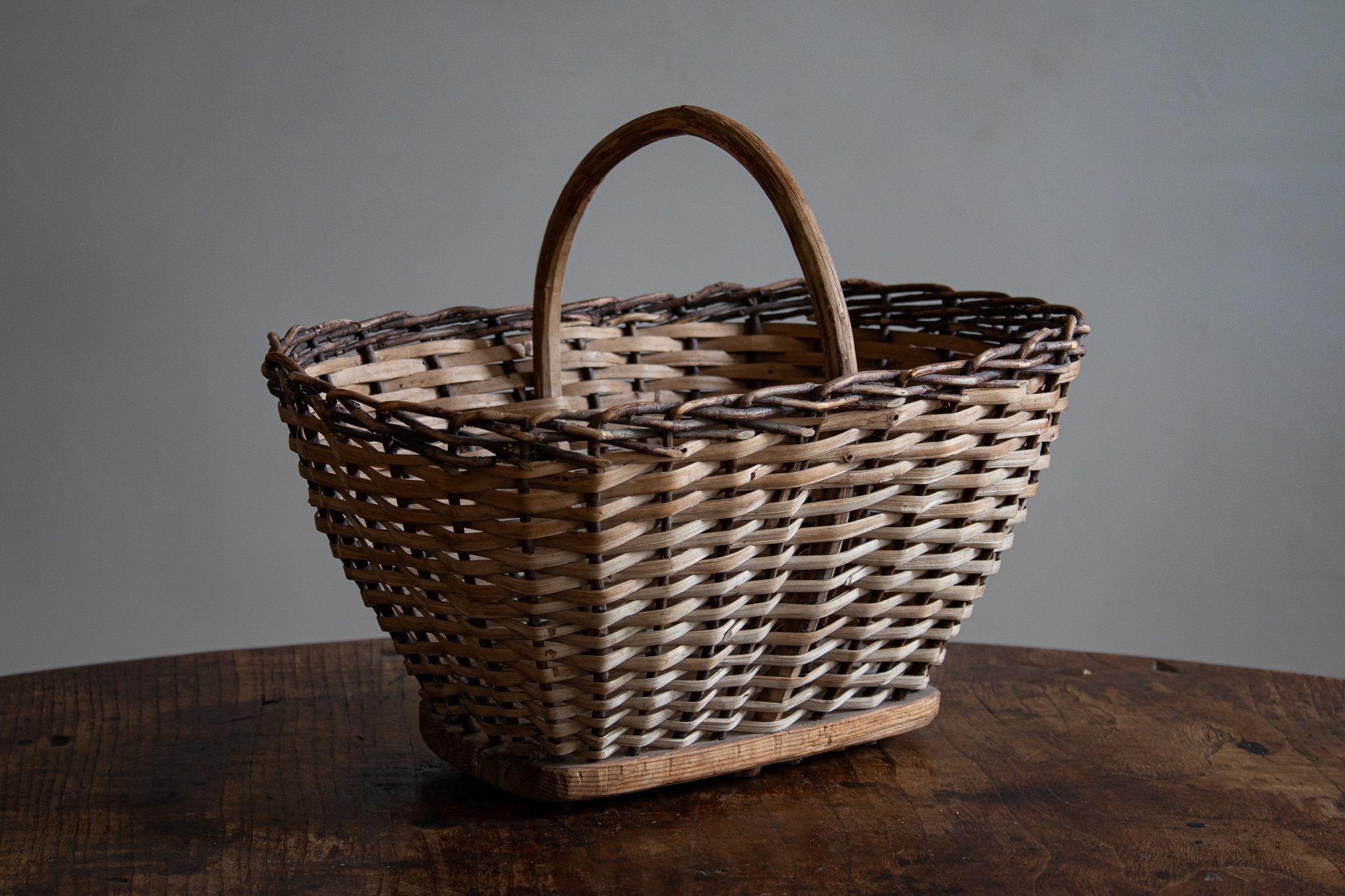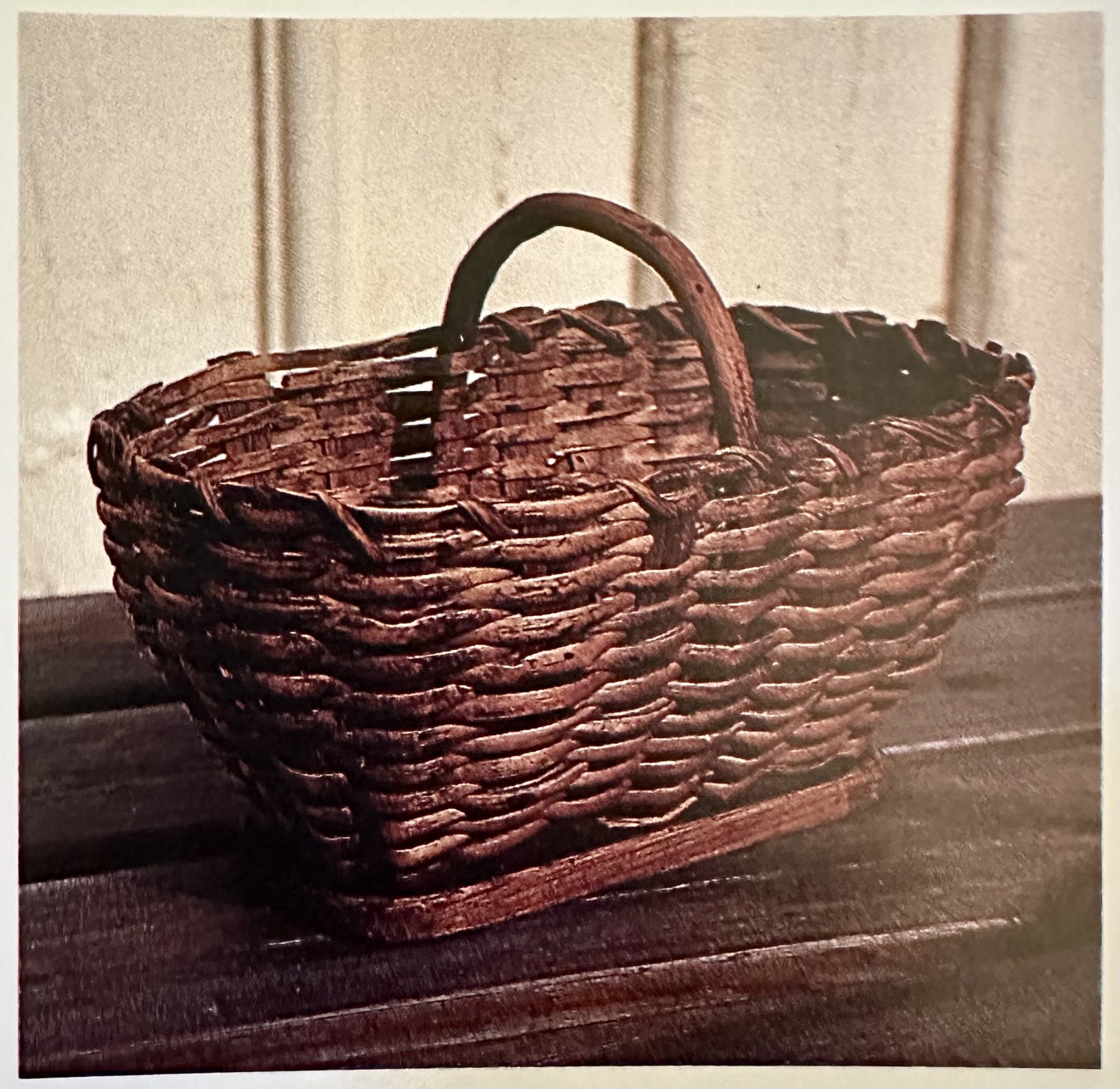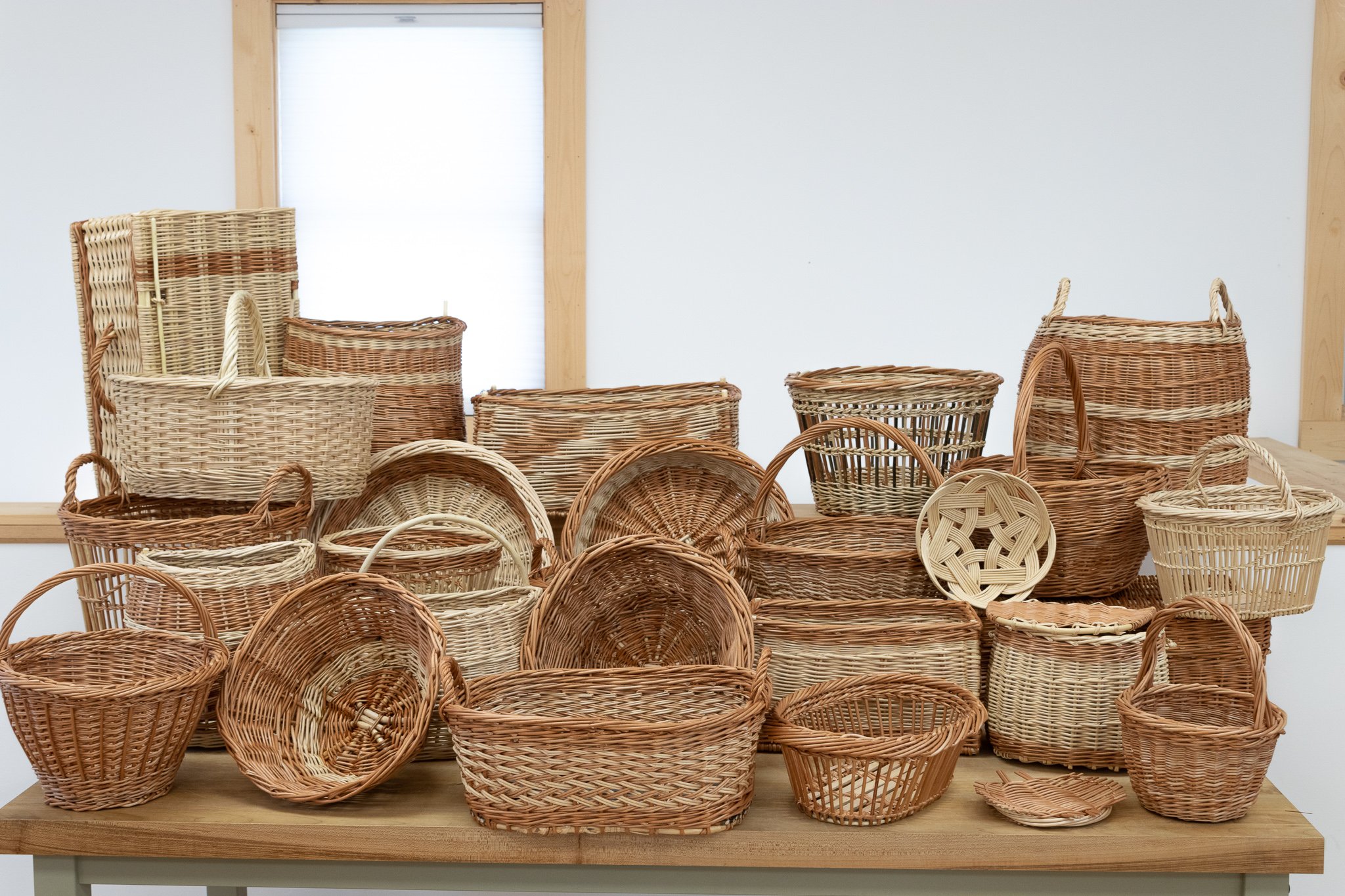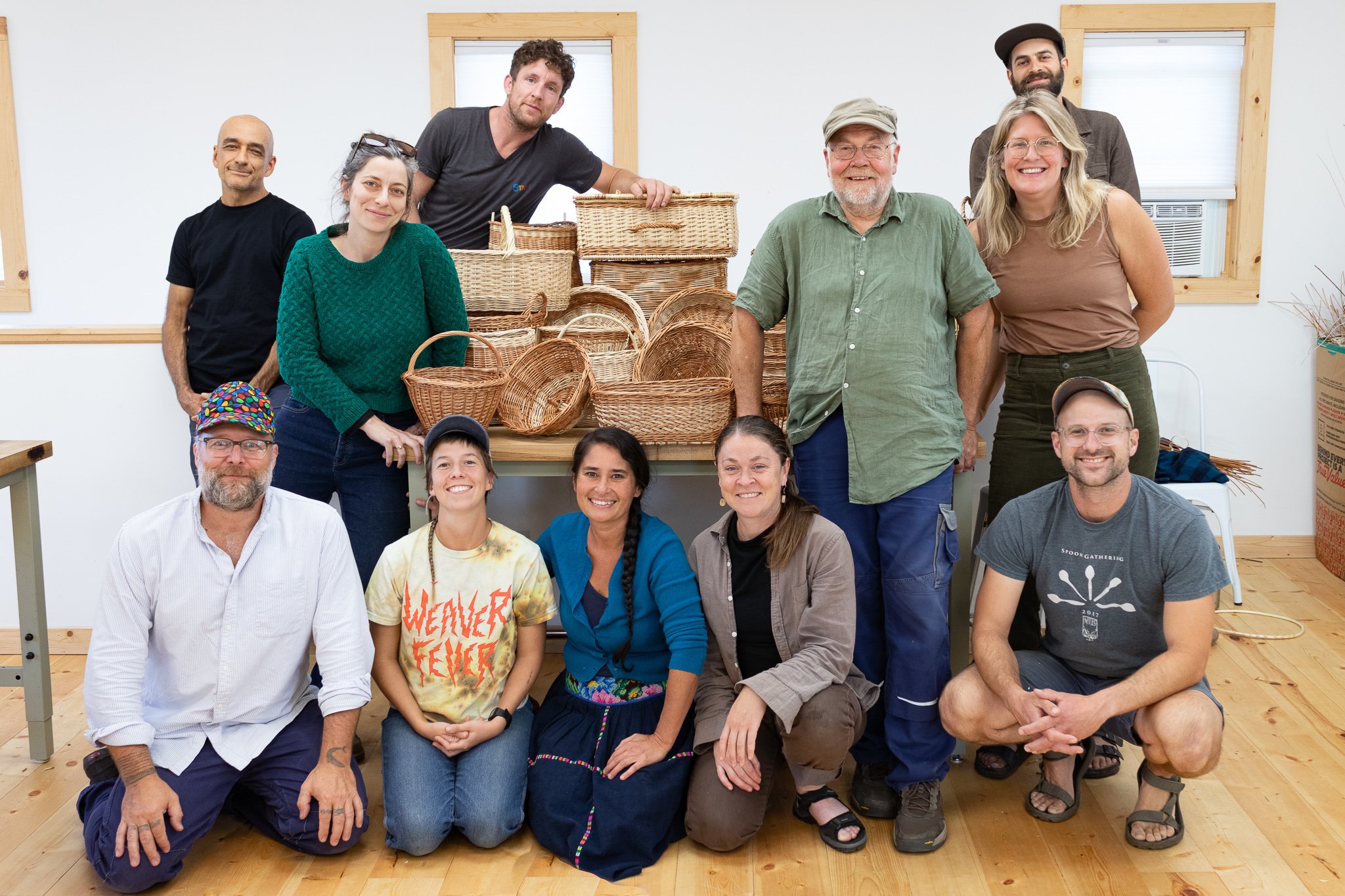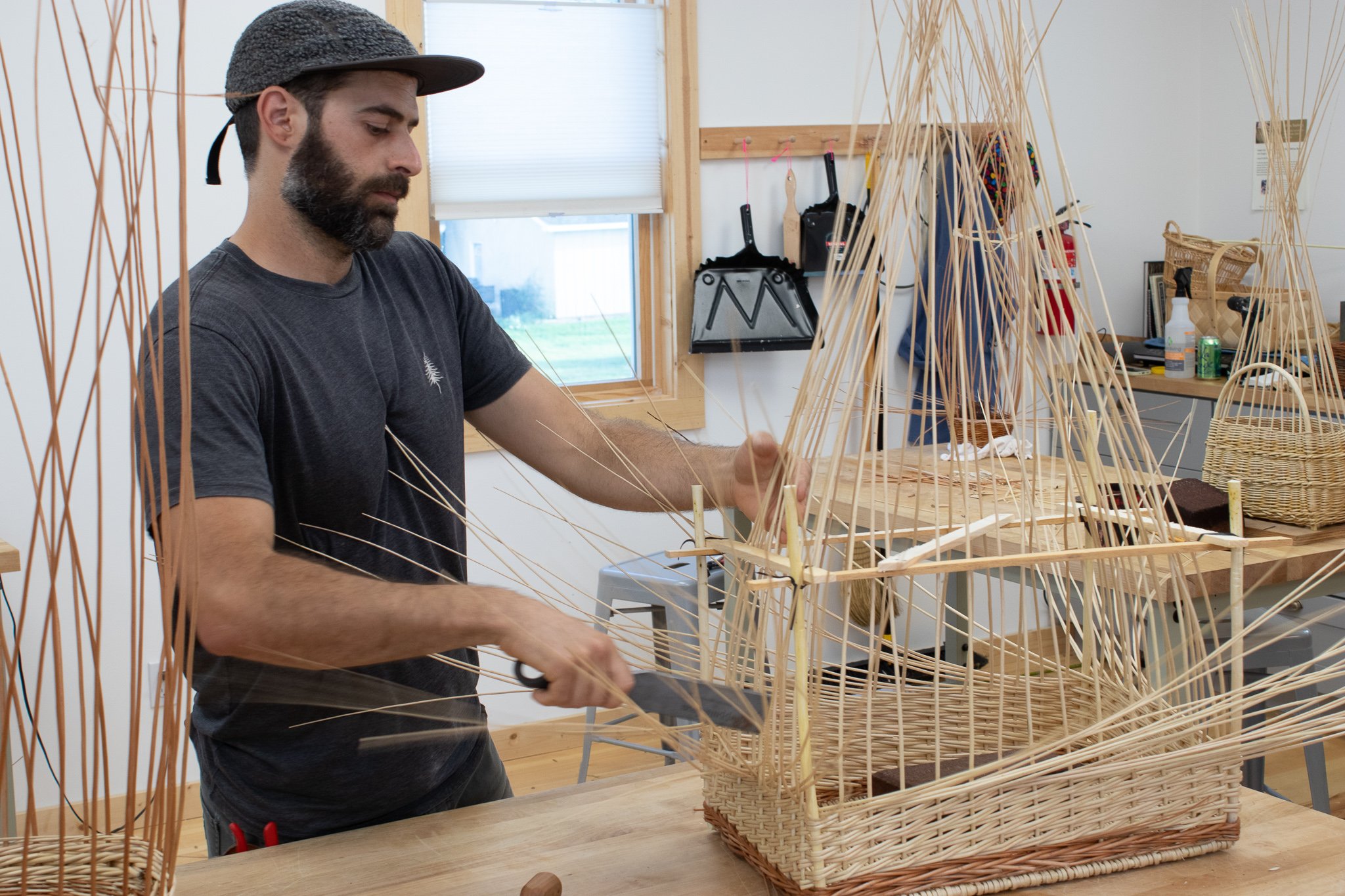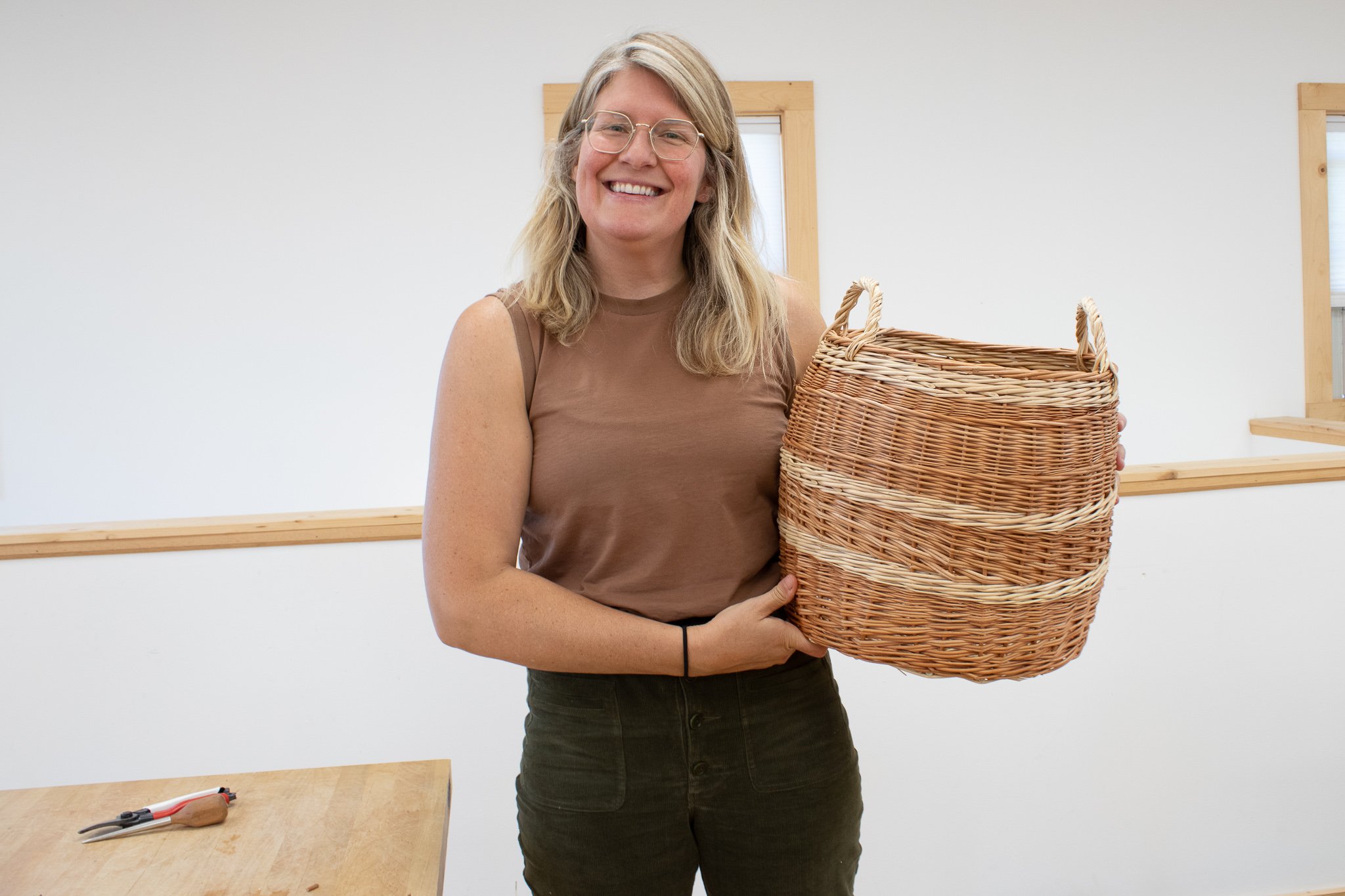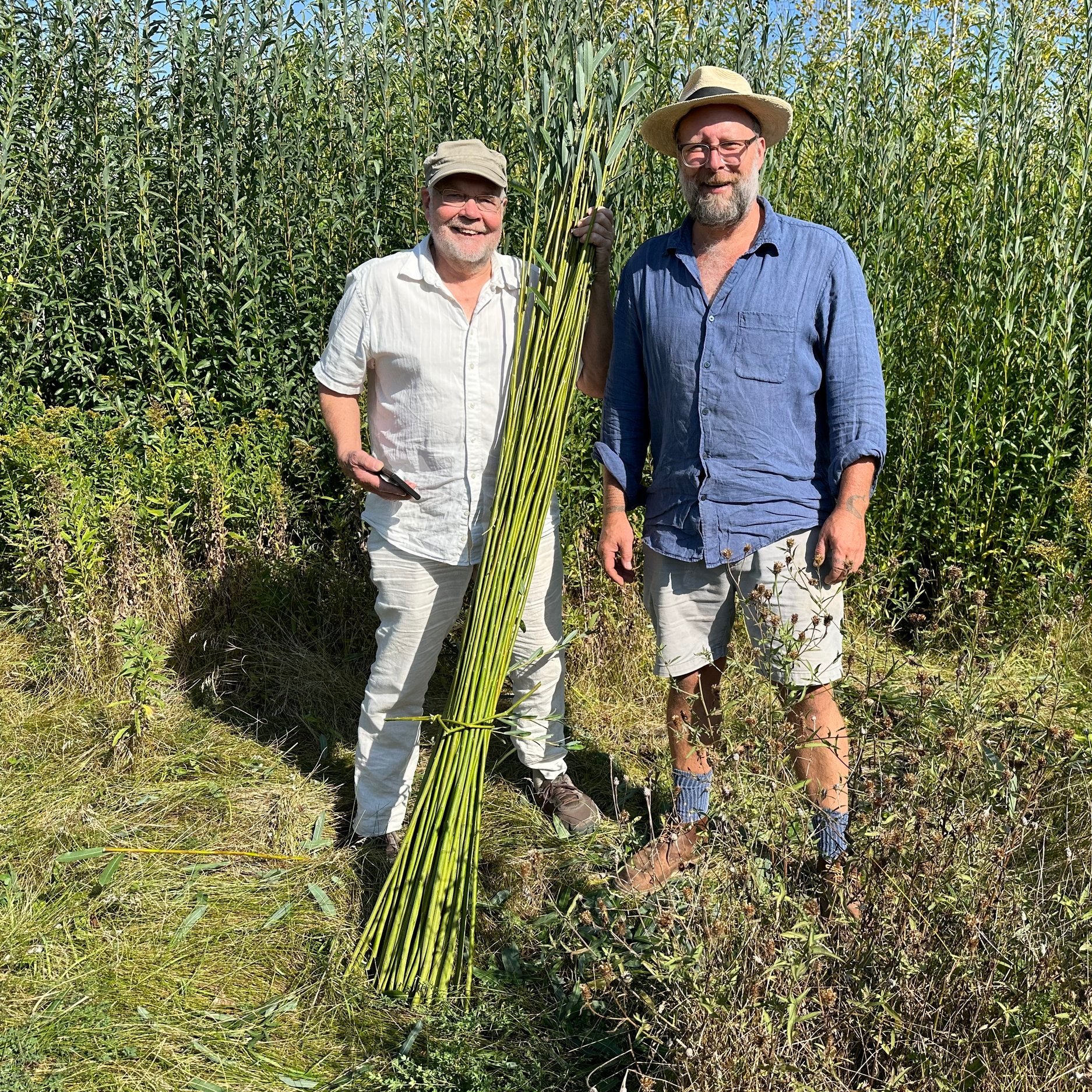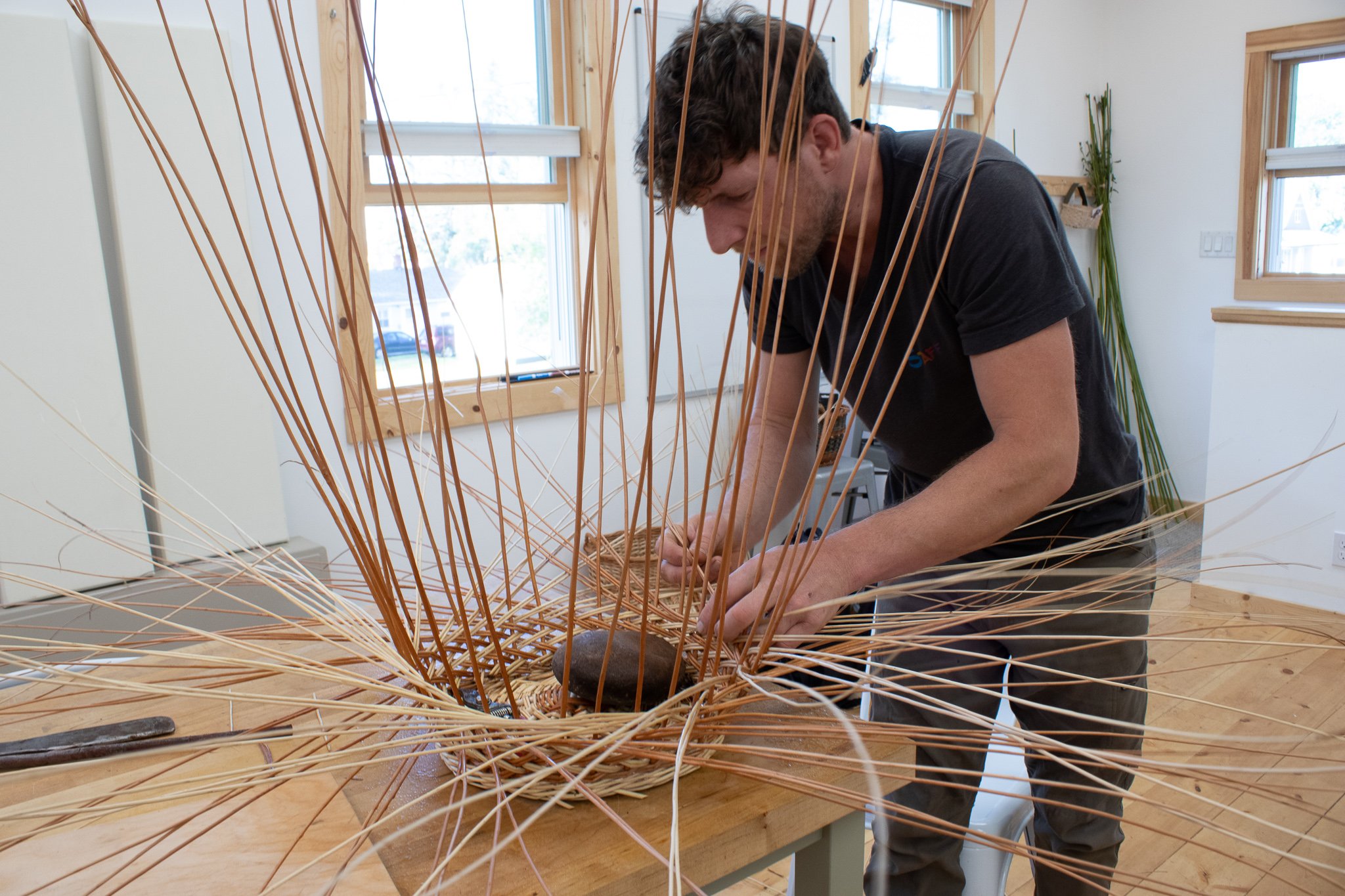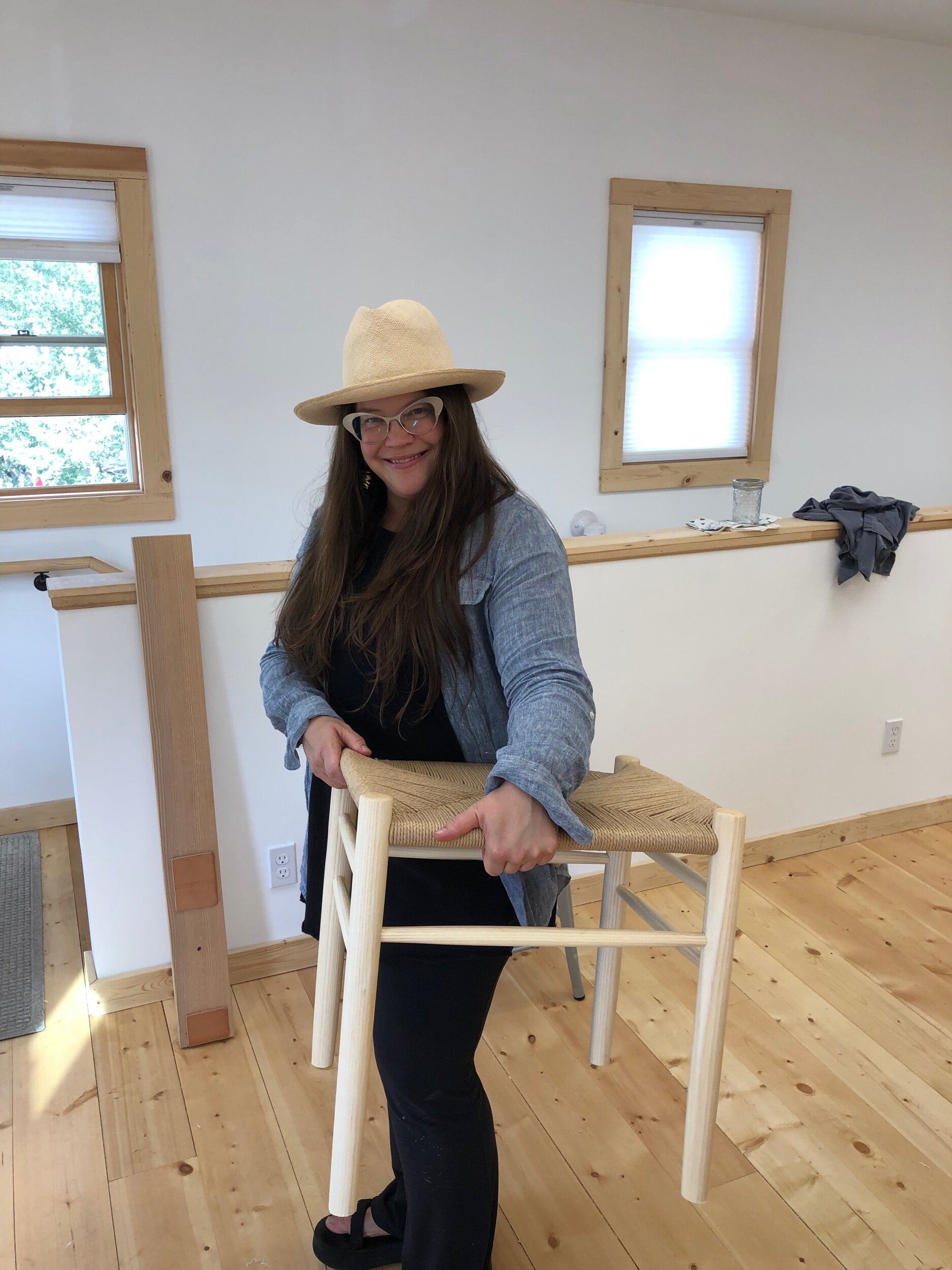——June 27-29——Danish Cord Post-and-Rung Stool with Dawson Moore
Related Courses/Events: Woodworking Courses, Basketry Courses
Registration closes June 13 so the instructor can prepare materials.
Dates: Friday, Saturday, & Sunday, June 27-29, 2025 9am-5pm
Optional: Thursday, June 26 Craft Night Potluck Meet & Greet with Dawson at 6pm BYOB
Description: Spend three days chair making with artist craftsman and furniture maker Dawson Moore at Woodspirit School in Ashland, WI. Make an elegant mid-century modern inspired wooden post-and-rung stool with a woven “rush” pattern (also called envelope pattern) Danish paper cord seat.
This stool blends inspiration in both construction process and design from the likes of the more traditional Jennie Alexander and Brian Boggs, to the more modern Danish designers Hans Wegner and Borge Mogensen. The stool’s joinery relies on the foundational concepts outlined in Alexander’s well known book “Make a Chair from a Tree” while also exploring modern efficiencies by using a lathe and drill press. The idea is to gain some increases in joint accuracy and to skip over some of the mundane aspects of a purely hand tool build, while still embracing the fun of splitting parts from a log and shaping with hand tools like spokeshaves and drawknives.
In this class we will:
Watch and get to practice splitting a few parts from a log.
Shape provided leg blanks with a drawknife and spokeshave.
Add a spokeshaved surface to provided rung turnings.
Watch a demo of turning parts and sizing tenons on a lathe.
Learn some of the concepts behind the stool’s design and its jigs to be able to apply to other designs.
Layout and bore rung mortises using simple and adaptable jigs.
Learn about proper grain orientation that ensures longevity of joints.
Learn how to use a shop made kiln to take advantage of the shrinking and expanding properties of wood.
Assemble the stool.
Apply an interesting new Japanese ceramic wood finish Hassui Ceramic.
Weave a “rush” pattern (also called envelope pattern) Danish paper cord seat.
Tool List:
Participants should bring a small kit of tools for the class. We’ll have extras of the recommended tools if your kit isn’t complete, but you’ll definitely need to bring the required tools.
Required Tools:
Gloves for Seat Weaving (I like the gloves at this link that are form fitting for good dexterity, leather soled for protection, and fabric backed for comfort and breathability. I recommend trying on in store to ensure a close fit.)
Ear & Eye Protection
Pencil
Recommended:
6” Ruler
Tape Measure
Folding Ruler
Sloyd Knife (Mora 106)
Spokeshave
Drawknife
Card Scraper
Side Cutters (for trimming Danish cord)
Workshop Fee: $400.
Materials fee: $200 to be paid directly to the instructor during class.
DAWSON MOORE lives and works on a sixth generation family farm in Harbor Springs, MI. After reestablishing roots at the farm in 2014, spoon carving became a full time obsession as he gained access to the native trees growing in the local forests. He spent the next several years harvesting his own wood, working it fresh from the log, and learning to use traditional hand tools and techniques to make a variety of spoons and other household items. More recently, he is focusing on designing and building stools and chairs. Even as he incorporates more modern working methods, he still feels a deep connection to the knowledge gained working directly from the woods with hand tools. Every chair still starts with a fresh log and an axe.
Related Courses/Events: Woodworking Courses, Basketry Courses
Registration closes June 13 so the instructor can prepare materials.
Dates: Friday, Saturday, & Sunday, June 27-29, 2025 9am-5pm
Optional: Thursday, June 26 Craft Night Potluck Meet & Greet with Dawson at 6pm BYOB
Description: Spend three days chair making with artist craftsman and furniture maker Dawson Moore at Woodspirit School in Ashland, WI. Make an elegant mid-century modern inspired wooden post-and-rung stool with a woven “rush” pattern (also called envelope pattern) Danish paper cord seat.
This stool blends inspiration in both construction process and design from the likes of the more traditional Jennie Alexander and Brian Boggs, to the more modern Danish designers Hans Wegner and Borge Mogensen. The stool’s joinery relies on the foundational concepts outlined in Alexander’s well known book “Make a Chair from a Tree” while also exploring modern efficiencies by using a lathe and drill press. The idea is to gain some increases in joint accuracy and to skip over some of the mundane aspects of a purely hand tool build, while still embracing the fun of splitting parts from a log and shaping with hand tools like spokeshaves and drawknives.
In this class we will:
Watch and get to practice splitting a few parts from a log.
Shape provided leg blanks with a drawknife and spokeshave.
Add a spokeshaved surface to provided rung turnings.
Watch a demo of turning parts and sizing tenons on a lathe.
Learn some of the concepts behind the stool’s design and its jigs to be able to apply to other designs.
Layout and bore rung mortises using simple and adaptable jigs.
Learn about proper grain orientation that ensures longevity of joints.
Learn how to use a shop made kiln to take advantage of the shrinking and expanding properties of wood.
Assemble the stool.
Apply an interesting new Japanese ceramic wood finish Hassui Ceramic.
Weave a “rush” pattern (also called envelope pattern) Danish paper cord seat.
Tool List:
Participants should bring a small kit of tools for the class. We’ll have extras of the recommended tools if your kit isn’t complete, but you’ll definitely need to bring the required tools.
Required Tools:
Gloves for Seat Weaving (I like the gloves at this link that are form fitting for good dexterity, leather soled for protection, and fabric backed for comfort and breathability. I recommend trying on in store to ensure a close fit.)
Ear & Eye Protection
Pencil
Recommended:
6” Ruler
Tape Measure
Folding Ruler
Sloyd Knife (Mora 106)
Spokeshave
Drawknife
Card Scraper
Side Cutters (for trimming Danish cord)
Workshop Fee: $400.
Materials fee: $200 to be paid directly to the instructor during class.
DAWSON MOORE lives and works on a sixth generation family farm in Harbor Springs, MI. After reestablishing roots at the farm in 2014, spoon carving became a full time obsession as he gained access to the native trees growing in the local forests. He spent the next several years harvesting his own wood, working it fresh from the log, and learning to use traditional hand tools and techniques to make a variety of spoons and other household items. More recently, he is focusing on designing and building stools and chairs. Even as he incorporates more modern working methods, he still feels a deep connection to the knowledge gained working directly from the woods with hand tools. Every chair still starts with a fresh log and an axe.
Related Courses/Events: Woodworking Courses, Basketry Courses
Registration closes June 13 so the instructor can prepare materials.
Dates: Friday, Saturday, & Sunday, June 27-29, 2025 9am-5pm
Optional: Thursday, June 26 Craft Night Potluck Meet & Greet with Dawson at 6pm BYOB
Description: Spend three days chair making with artist craftsman and furniture maker Dawson Moore at Woodspirit School in Ashland, WI. Make an elegant mid-century modern inspired wooden post-and-rung stool with a woven “rush” pattern (also called envelope pattern) Danish paper cord seat.
This stool blends inspiration in both construction process and design from the likes of the more traditional Jennie Alexander and Brian Boggs, to the more modern Danish designers Hans Wegner and Borge Mogensen. The stool’s joinery relies on the foundational concepts outlined in Alexander’s well known book “Make a Chair from a Tree” while also exploring modern efficiencies by using a lathe and drill press. The idea is to gain some increases in joint accuracy and to skip over some of the mundane aspects of a purely hand tool build, while still embracing the fun of splitting parts from a log and shaping with hand tools like spokeshaves and drawknives.
In this class we will:
Watch and get to practice splitting a few parts from a log.
Shape provided leg blanks with a drawknife and spokeshave.
Add a spokeshaved surface to provided rung turnings.
Watch a demo of turning parts and sizing tenons on a lathe.
Learn some of the concepts behind the stool’s design and its jigs to be able to apply to other designs.
Layout and bore rung mortises using simple and adaptable jigs.
Learn about proper grain orientation that ensures longevity of joints.
Learn how to use a shop made kiln to take advantage of the shrinking and expanding properties of wood.
Assemble the stool.
Apply an interesting new Japanese ceramic wood finish Hassui Ceramic.
Weave a “rush” pattern (also called envelope pattern) Danish paper cord seat.
Tool List:
Participants should bring a small kit of tools for the class. We’ll have extras of the recommended tools if your kit isn’t complete, but you’ll definitely need to bring the required tools.
Required Tools:
Gloves for Seat Weaving (I like the gloves at this link that are form fitting for good dexterity, leather soled for protection, and fabric backed for comfort and breathability. I recommend trying on in store to ensure a close fit.)
Ear & Eye Protection
Pencil
Recommended:
6” Ruler
Tape Measure
Folding Ruler
Sloyd Knife (Mora 106)
Spokeshave
Drawknife
Card Scraper
Side Cutters (for trimming Danish cord)
Workshop Fee: $400.
Materials fee: $200 to be paid directly to the instructor during class.
DAWSON MOORE lives and works on a sixth generation family farm in Harbor Springs, MI. After reestablishing roots at the farm in 2014, spoon carving became a full time obsession as he gained access to the native trees growing in the local forests. He spent the next several years harvesting his own wood, working it fresh from the log, and learning to use traditional hand tools and techniques to make a variety of spoons and other household items. More recently, he is focusing on designing and building stools and chairs. Even as he incorporates more modern working methods, he still feels a deep connection to the knowledge gained working directly from the woods with hand tools. Every chair still starts with a fresh log and an axe.




